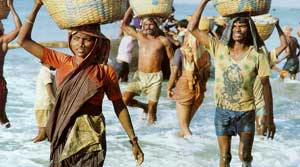|
The trading of fish is as old as Asia. Although the dispersed millions involved in fisheries did so for a livelihood, once a fishworker netted more than a few fish, she or he had a ‘surplus’ to be bartered. So, fish was traded right from the beginning. Relatively labour-intensive, fishing soon accounted for substantial domestic nutrition. Today Asian fishers account for half the global trade in fish.
But to suggest that the market can provide the solution to all the problems faced by the fishery is quite another proposition. Intervention by powerful Northern enterprises, who can modulate markets using ‘environmental’ considerations, can have far-reaching benefits and also pitfalls.
In most Third World countries, markets are created for society and not the other way around. The MSC initiative subscribes to the view that ‘free markets’ will replace regulation by democratic institutions and wishes this norm to attain worldwide applicability.
This is a threatening scenario for the countries containing the
majority of the world’s population. In democratic institutions
the initial endowments of the participants are the same –
everybody has one vote. Market institutions, on the other
hand, are not such levellers. They function on votes that are
expressed only in money terms – effective purchasing power
– which, as we all know, are hardly distributed equally on the
basis of the world’s population.
|


